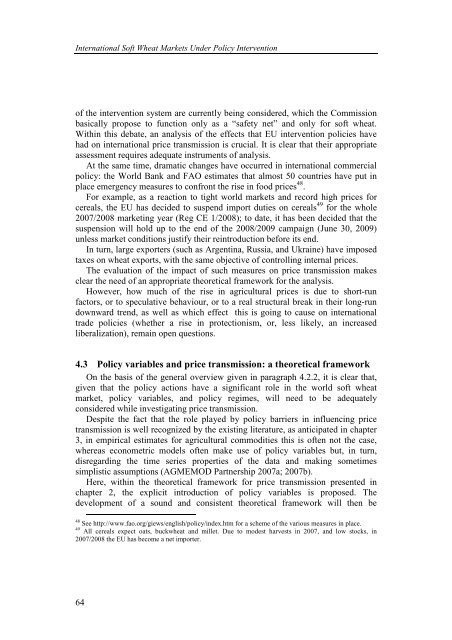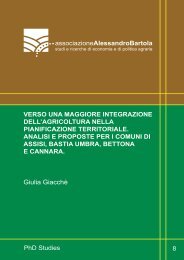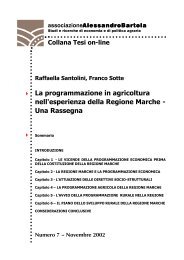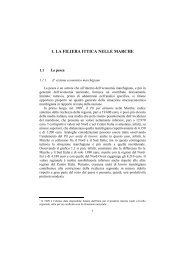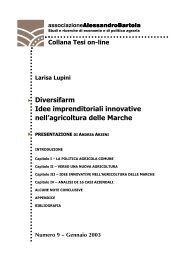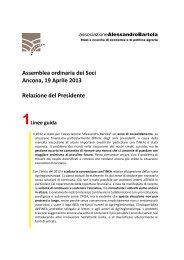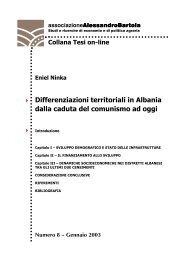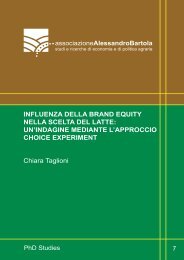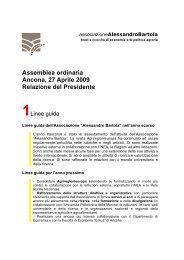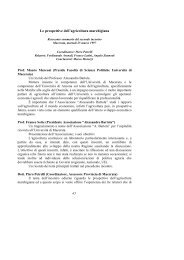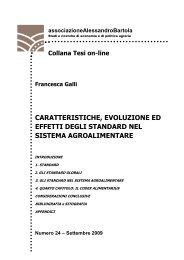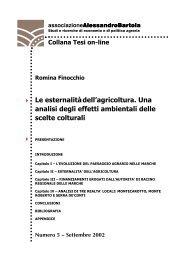TESTING INTERNATIONAL PRICE TRANSMISSION UNDER ...
TESTING INTERNATIONAL PRICE TRANSMISSION UNDER ...
TESTING INTERNATIONAL PRICE TRANSMISSION UNDER ...
Create successful ePaper yourself
Turn your PDF publications into a flip-book with our unique Google optimized e-Paper software.
International Soft Wheat Markets Under Policy Intervention<br />
of the intervention system are currently being considered, which the Commission<br />
basically propose to function only as a “safety net” and only for soft wheat.<br />
Within this debate, an analysis of the effects that EU intervention policies have<br />
had on international price transmission is crucial. It is clear that their appropriate<br />
assessment requires adequate instruments of analysis.<br />
At the same time, dramatic changes have occurred in international commercial<br />
policy: the World Bank and FAO estimates that almost 50 countries have put in<br />
place emergency measures to confront the rise in food prices 48 .<br />
For example, as a reaction to tight world markets and record high prices for<br />
cereals, the EU has decided to suspend import duties on cereals 49 for the whole<br />
2007/2008 marketing year (Reg CE 1/2008); to date, it has been decided that the<br />
suspension will hold up to the end of the 2008/2009 campaign (June 30, 2009)<br />
unless market conditions justify their reintroduction before its end.<br />
In turn, large exporters (such as Argentina, Russia, and Ukraine) have imposed<br />
taxes on wheat exports, with the same objective of controlling internal prices.<br />
The evaluation of the impact of such measures on price transmission makes<br />
clear the need of an appropriate theoretical framework for the analysis.<br />
However, how much of the rise in agricultural prices is due to short-run<br />
factors, or to speculative behaviour, or to a real structural break in their long-run<br />
downward trend, as well as which effect this is going to cause on international<br />
trade policies (whether a rise in protectionism, or, less likely, an increased<br />
liberalization), remain open questions.<br />
4.3 Policy variables and price transmission: a theoretical framework<br />
On the basis of the general overview given in paragraph 4.2.2, it is clear that,<br />
given that the policy actions have a significant role in the world soft wheat<br />
market, policy variables, and policy regimes, will need to be adequately<br />
considered while investigating price transmission.<br />
Despite the fact that the role played by policy barriers in influencing price<br />
transmission is well recognized by the existing literature, as anticipated in chapter<br />
3, in empirical estimates for agricultural commodities this is often not the case,<br />
whereas econometric models often make use of policy variables but, in turn,<br />
disregarding the time series properties of the data and making sometimes<br />
simplistic assumptions (AGMEMOD Partnership 2007a; 2007b).<br />
Here, within the theoretical framework for price transmission presented in<br />
chapter 2, the explicit introduction of policy variables is proposed. The<br />
development of a sound and consistent theoretical framework will then be<br />
48 See http://www.fao.org/giews/english/policy/index.htm for a scheme of the various measures in place.<br />
49 All cereals expect oats, buckwheat and millet. Due to modest harvests in 2007, and low stocks, in<br />
2007/2008 the EU has become a net importer.<br />
64


